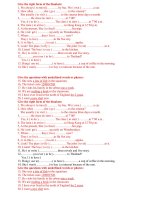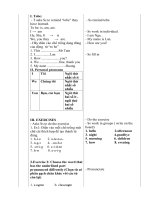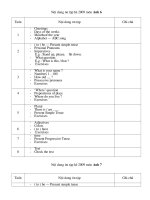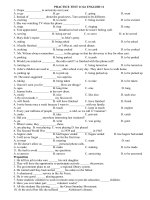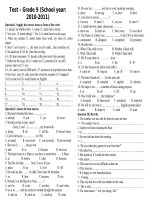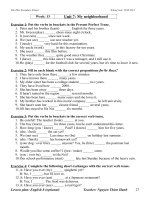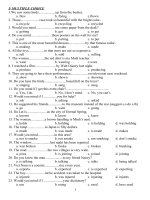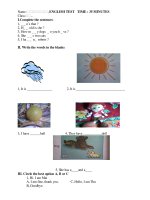Bai Tap Anh 9
Bạn đang xem bản rút gọn của tài liệu. Xem và tải ngay bản đầy đủ của tài liệu tại đây (105.4 KB, 6 trang )
BÀI TẬP RÈN LUYỆN VỀ MỆNH ĐỀ QUAN HỆ
Exercise 1: Make one sentence from two. Use WHO / THAT / WHICH :
1. A girl is now in hospital. She was injured in the accident.
2. A building was destroyed in the fire. It has now been rebuilt..
3. A bus goes to the airport. It runs every half hour.
4. I saw the man. He closed the door.
5. The girl is happy. She won the race.
6. The student is from China. He sits next to me.
7. We are studying sentences. They contain adjective clauses.
8. The taxi driver was friendly. He took me to the airport.
9. The woman was polite. She answered the phone.
10.The man has a good voice. He sang at the concert.
11.We enjoyed the actors. They played the leading roles.
12.The student is in my class. He is walking with Ann.
13.There is a new house in our neighborhood. It has a swimming pool.
14.This is the package. It came in the mail today.
15.I like the songs. They tell about life in the country.
Exercise 2: Join the sentences using WHO, WHEN, WHERE, WHICH or WHOSE:
1. She’s the girl. She works in the library.
2. Here’s the alarm clock. I bought it yesterday.
3. I’ve spoken to John. His house was burgled last Monday.
4. That’s the lady. Her jewellery was stolen.
5. That is the radio. I won it in the competition.
6. John is the man. His house was destroyed by the fire.
7. There is the hospital. I was born there.
8. That was the summer. I met my wife then.
9. France is the country. The best wine is produced there.
10.1945 was the year. The Second World War ended then.
11.That’s the hotel. I stayed there last summer.
12.August is the month. Most people go on holiday then.
Bài Tập Câu So Sánh (Comparative)
I. Use the given words to write the sentences in comparative and superlative form. (2m)
1. She/ be/ beautiful/ than/ her mother.
2. My house/ be / far/ than/ than yours.
3. They/ be/ the/ intelligent/ in his family.
4. My car/ be/ be/ good/ than mine.
5. This building/ be/ the/ tall/ in this city.
6. Long/the/ tall/ student/ in my class.
7. Theses car/ the/ cheap/ in the garage.
8. My computer/ the/ small/ one.
9. Their homework/ the/ good.
10.His writing/ the/ bad.
11.They/ the/ beautiful/ girls/ in my class.
12.These books/ the / expensive/ ones.
13.Mary/ intelligent/ student/ in my college.
14.Their story/ the/ interesting/ one.
15. He/ the/ lazy/ student/ in my class.
16.He/ be/ tall/ than/ his brother.
17.This house/be/ expensive / than/ your house.
18.He/ be/ the/ intelligent/ in his family.
19.My car/ be/ the/ good/ one.
20.He/ be/ the/ small/ student/ in our class.
II, Choose the best answer to complete the sentences below. ( 2 m )
1. This exercise is ( difficult/ difficulter/ more difficult ) than that one.
2. They are ( more beautiful/ beautifuller/ more beautiful ) than us.
3. Jane is ( more lazy/ lazy/ lazier ) than his father.
4. There is ( any/ much/ many ) coffee in the kitchen.
5. There are ( many/ any/ much ) sausages in the shop.
6. How ( often/ much/ many ) computers are there in your room?
7. How ( many/ much/ often ) bread is there on the table ?
8. He has ( some/ any/ a ) new English book.
9. Do they have ( some/ an/ any ) brothers or sisters ?
10. Mark often eat ( some/ an/ any ) apple before the meal.
Bài Tập Câu Bị Động (Passive Voice)
1. Tom delivers the mail every day
2. Fire destroyed that house
3. Bob took that book from the desk
4. Barbara will eat the cake
5. Beth has finished the report
6. The police easily captured the thief
7. The students attended the lecture
8. The movie disappointed us very much
9. Mr. John manages the export division
10.John returned the money last night
11.The teacher corrects our exercises
12.They started a dancing class last week
13.Mr. Smith saw the accident
14.Somebody has taken my briefcase
15.The teacher returned our written work to us
16.She has finished the report by noon
17.The mad dog bit the little boy
18.The police have arrested five suspects
19.The doctor ordered him to take a long rest
20.Lightning struck the house
21. No one believes his story
22. We must take good care of books borrowed from the library
23. We can never find him at home for he is always on the movie
24. They use milk for making butter and cheese
25. John used to visit Mr. Cole at weekends
26.They can’t make tea with cold water
27.The chef engineer was instructing all the workers of the plant
28.Some body has taken some of my books away
29.They will hold the meeting before May Day
30.They have to repair the engine of the car
31.The boys broke the window and took away some pictures
32.People spend a lot of money on advertising everyday
33.They may use this room for the classroom
34.The teacher is going to tell a story
35.Mary is cutting the cake with sharp knife
36.People speak English in almost every corner of the world
37.You must clean the wall before you paint it
Câu Trực Tiếp Gián Tiếp ( INDIRECT SPEECH )
A) Change the following sentences from DIRECT to INDIRECT SPEECH:
1. He said, “I will be here at noon.”
He said that he would be here at noon.
2. Mary said, “The train will probably arrive on time.”
3. He said, “I have to finish this report by five o’clock.”
4. The doctor said, “Mr. Smith will improve quickly.”
5. William said to me, “I am leaving in the morning.”
6. The teacher said, “Everyone has to write a composition.”
7. John said, “I saw that movie on Wednesday.”
8. Helen said, “I have read that book.”
9. Mary said to John, “I cannot go to the movie with you.”
10.John said, “I have finished studying my lesson.”
11.Mary remarked, “John speaks English well.”
12.William said to me, “I will not see Mr. Jones until Tuesday.”
13.Mr. Smith said, “I will refuse their offer.”
14.John said, “I certainly hope it won’t rain tomorrow.”
15.Henry said, “I can meet them later.”
16.The boy said, “I am only eight years old.”
17.She said to me, “The lights have gone out.”
18.The man said, “The telephone is out of order.”
19.He said, “I will never speak to her again.”
20.I said to the clerk clearly, “I have already paid that bill.”
C) Wh- questions:
Examples: * “What is the time?” he asked.
He asked me what the time was.
* “Where do you live?” he asked Mary.
How wanted to know where Mary lived.
1. He asked, “How long does it take you to have lunch?”
2. He asked me, “What are you doing at the weekend?”
3. She asked, “Why are you late, Tom?”
4. My mother asked me, “Where is your umbrella?”
5. The secretary asked the man, “Who do you want to see, sir?”
6. The students asked, “What time does the bell ring?”
7. He asked Tom, “What kind of films do you like watching?”
8. The teacher asked the girl, “When do you have to be home?”
9. They always asked, “Why don’t you let my cat in?”
10.The passengers asked, “When did the last train leave?”
11.He asked, “What will you do tomorrow, Jane?”
D) Yes / No questions:
Examples: * “Are you busy?” he asked me.
He asked me IF I was busy.
* “Do you like banana?” he asked his friends.
He asked his friends IF they liked banana.
1. She asked, “Do you live with your family, Helen?”
2. He asked, “Can I borrow your pen, Linda?”
3. He asked me, “Does your uncle live in England?”
4. Mary asked Lucy, “Will you come to my party tomorrow?”
5. Mark asked, “Did you phone me last night, John?”
6. He asked, “Is this yours or mine, David?”
7. She always asked me, “Must you always ask me what I’m doing?”
8. The teacher asked, “Are you listening to me?”
9. Mary asked, “Do you want me to help you, Larry?”
10.The officer asked, “Are you a foreigner? Can you spell your name?”
E) Change into INDIRECT SPEECH:
1. Bob says, “I want to play tennis this afternoon.”
2. John says, “I haven’t seen my grandmother for a long time.”
3. Cindy says to Alan, “Don’t come in with your dirty shoes.”
4. My father says, “Please, help me in the garden.”
